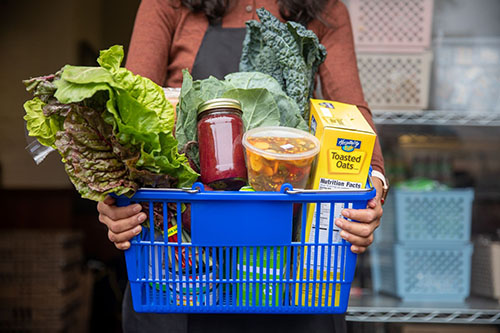Campus News
UC Santa Cruz Foundation awards $75K to help address student food insecurity
The UC Santa Cruz Foundation Board of Trustees has affirmed its commitment to reducing food and housing insecurity for students.

The UC Santa Cruz Foundation Board of Trustees has affirmed its commitment to reducing food and housing insecurity for students. Following its February decision to provide an additional $900,000 one-time distribution to support endowed scholarships and fellowships across campus, the board voted Oct. 8 to allocate $75,000 to the Center for Agroecology and the Division of Student Affairs and Success to support efforts to address food insecurity among students.
“I am deeply grateful that the UC Santa Cruz Foundation board has proactively engaged with university leadership to address this critical need of the campus and especially of our students,” said UCSC Chancellor Cynthia Larive. “We are working to pull all the levers we have at our control to address student food insecurity. With the foundation’s much-appreciated support, I am confident we will be able to make great progress.”
Recent surveys reflect that as many as 41 percent of U.S. college students experience limited or uncertain access to food. A chronic problem that dates back years, it’s exasperated by the rampant inflation of food costs hurting families nationwide. UC Santa Cruz recognizes that the need is great: Food-deprived college students exhibit poorer academic performance. Worse, according to the National Student Campaign Against Hunger and Homelessness, the negative outcomes hit Black, first-generation and two-year college students hardest, widening racial and income inequalities.
“We wanted to help and in a very direct way,” said UCSC Foundation Chair Richard Moss (Stevenson ’85). “Board members were inspired to support UC Santa Cruz in developing a roadmap promoting food security, not only for our campus, but as a model for all UC campuses.”
The board’s commitment will help UCSC in its effort to surpass the University of California Regents’ goal of reducing food and housing insecurity among students by 50 percent by 2025. Systemwide and campus-level research affirm the positive impact of basic needs services on access, affordability, persistence, academic performance, sense of belonging, time to degree, and graduation rates of both undergraduate and graduate students.
UCSC is primed to advance a 2025 UCSC Road Map to Food Security (Design and Action Plan). The capacity to coordinate and engage a greater range of stakeholders in the Regent level goals is the plan’s next step.
The foundation grant will directly support students, funding salaries for student project leads who will help develop the road map, convene stakeholders and identify outcomes, as well as “food security” student staff to assist with stakeholder service opportunities and connection events, food production, and peer-to-peer student engagement.
“Championing student success means doing all we can to ensure equal and equitable access to the full student experience,” said Akirah Bradley-Armstrong, Vice Chancellor for Student Affairs and Success. “Too many of our students struggle with food insecurity and too few have access to the means and resources to resolve this struggle. While the university has long tried to fill these gaps, this funding is critical to ensuring student well-being and equipping each of our students with the time and energy they need to better focus on their learning in and out of the classroom. In order to truly center our students in all we do, we must first be certain their most basic needs are met.”
The foundation board was seeking to support an across-campus initiative that aligned with the Student Success Initiative. Campus and Foundation leadership worked with Darryl Wong, executive director of the Center for Agroecology, and Tim Galarneau, education and research specialist at the center, to develop the plan for this project.
The Center for Agroecology has played a leading role in creatively tackling food security. The center supports a different type of food pantry—harvesting and delivering over 20,000 pounds of fresh organic fruits and vegetables each year—as well as supporting a non-transactional cafe where students eat free of charge. In an effort to further support students’ needs, the produce is grown, harvested and delivered by students who earn more than minimum wage.
“Food security isn’t just about access to food, it’s also about having meaningful employment that supports all of the costs of being a student,” Wong said
In addition to helping fund the development of an actionable plan for UC Santa Cruz, foundation trustees have committed to promoting the effort through their individual networks and to hosting a food security benefit event in 2023 to launch the plan.